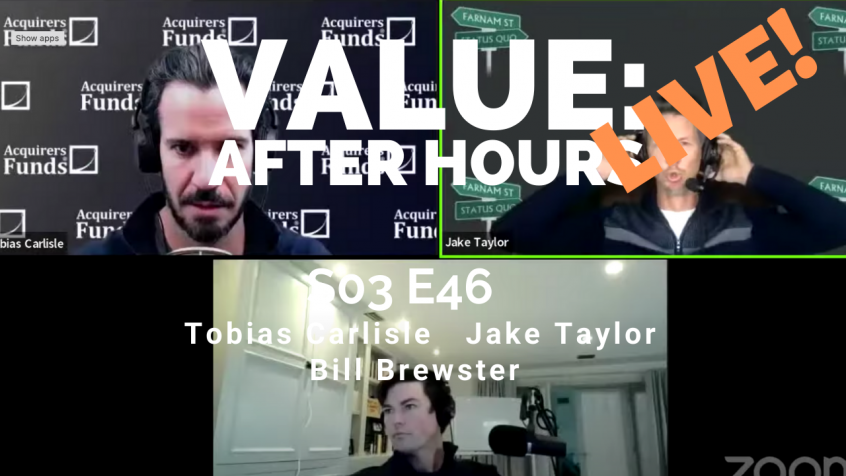In their recent episode of the VALUE: After Hours Podcast, Taylor, Brewster, and Carlisle discuss Why Picking High Growth Winners Is So Hard. Here’s an excerpt from the episode:
Bill: I think you could buy him here with a long enough time horizon. I totally agree that you could have a drawdown and I could be totally wrong. But I think a much more dangerous game is going down in quality chasing a multiple than it is like trading. I want to be very careful because I’m a Toby’s program, and I want to be very clear that like– [crosstalk]
Tobias: I’m happy to talk about. Let’s go for it. I’m not going to be offended by it.
Bill: I know. But what I like about what you do is, it systematizes. So, the thing that makes sense to me about value is, you’re exploiting a behavioral bias, right? You’re saying the market hates this too much, and I’m the one that can exploit it. It makes sense to me to outsource exploiting behavior to a machine. To be the person that wants to exploit that, I think is a tough thing for me to fully buy any more than I buy that people can analyze businesses and pick a winning business and hold it for the really long term.
Tobias: Yeah. You got two issues, right? So, if you’re explicitly a high growth, high-quality investor with value as a secondary consideration or no consideration at all, the risk that you run is that the business becomes less good over time and warrants less of a multiple. That’s how you won’t subpar returns. To be playing that game, you have to be an absolute demon at analyzing businesses. It’s very, very tough because every other capitalist in the world is trying to figure out how to get those kinds of returns, and they’re going to attack that little area.
On the other hand, if you’re going to be deep value, what you have to do is, you know, what you’re saying is this business isn’t going to deteriorate as fast as the rest of the market thinks. I do think you can find these occasions where basically, the market is saying, “This business is not going to ever grow again or it’s going to continue shrinking forever.” The outside view of it is, it’s a little bit more cyclical than that, there are going to be exits from this industry, this thing can survive, this thing can do a little bit better than that. In my personal opinion, that’s an easier assessment than doing the good business remaining good for a very long period of time. I think that’s a really difficult thing to do. But that has been paid better over the last five or six years.
Bill: Yeah, I guess, where I probably disagree is that, I don’t think the latter is any easier than the former. I think the latter may– you may get bailed out more by multiple. I think it may be– studies have shown value’s a better pond the fish in, but I don’t think that that’s any easier of a game at all. I think they both are really, really hard.
Tobias: I agree. There’s no easy trade. There’s no easy spot. They’re both difficult. I just think that the more conservative approach is a little bit easier. But then we have gone through this unusual period too, where there is this very that Marc Andreessen quote about software eating the world, that does seem to be coming true. And when these software star businesses move into some of these older style industries, the older style industries get destroyed, get knackered by when that happens. So, I think that just focusing on the cheapness of the business with no view of what is happening competitively in the industry is a mistake and it’s one that I’ve made lots of times. But I do think it– [crosstalk]
Jake: It’s kind of second-order question of that though of, In a world where we turn up the coefficient of change going forward, which gets harder? Does it get harder to know about the good businesses and what they’re going to look like and continue to look like or does it get harder to untangle secular versus cyclical problems with a business that may or may not mean revert now?
Tobias: Yeah. Will creative destructive insurgent be itself disrupted in short order. So, do they warrant those very high multiples? Those are virtually impossible questions to answer. But I have to– [crosstalk]
You can find out more about the VALUE: After Hours Podcast here – VALUE: After Hours Podcast. You can also listen to the podcast on your favorite podcast platforms here:
For all the latest news and podcasts, join our free newsletter here.
Don’t forget to check out our FREE Large Cap 1000 – Stock Screener, here at The Acquirer’s Multiple:



